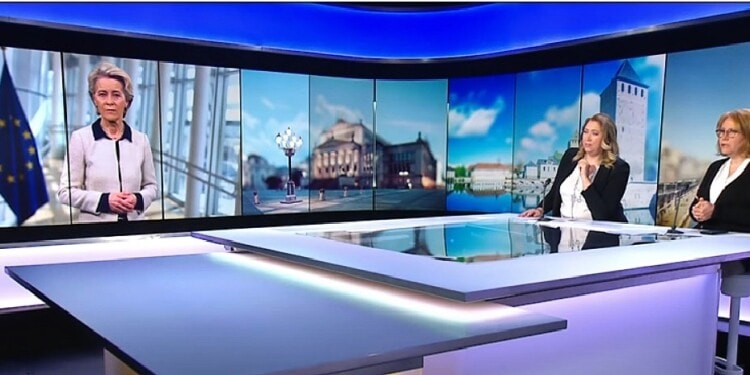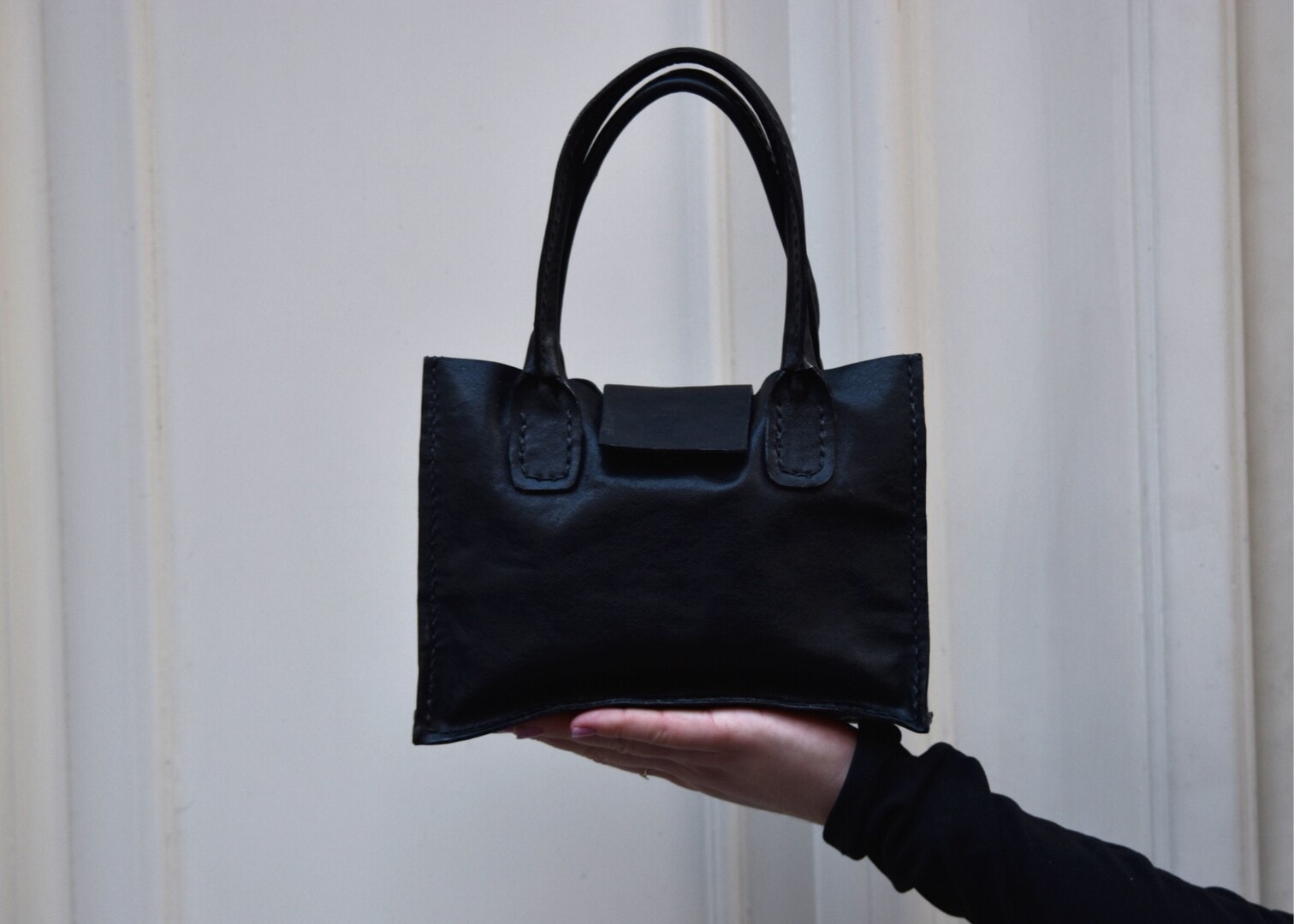For Ursula von der Leyen, the President of the European Commission, what is at stake in the Ukraine war is clear: “Democracy is standing up against autocracy” she told France 24 in an interview on 18 March that was done in French.
In a talk that lasted nearly 20 minutes, she laid out in detail the EU position regarding Russia and Ukraine, covering all the main points, from the threat to global food security to humanitarian and military assistance to Ukraine. The recording of that interview is worth watching in its entirety:
If you watch the video in the original (click here) you will see that Von der Leyen is at ease in French, this is a language she knows well. She was born in Brussels in 1958 and brought up bilingually in French and German, as her father Ernst Albrecht was one of the first to serve as a European civil servant in the early European institutions before he turned to politics and the family went back to Hanover in 1971.
Von der Leyen got involved in local politics in the 1990s and joined first the Christian Democratic Union (CDU), Angela Merkel’s party, then her government in 2005 where she held increasingly important ministerial posts. She was the first woman to serve as German defense minister from 2013 to 2019 when she was elected by the European Parliament to lead the European Commission.
The interview starts off with Von der Leyen noting the excessive cruelty of this war and the damage done so far in terms of lost lives, over three million people displaced, and another three million fleeing and seeking refuge in Europe. As she put it, “we are receiving them with open arms”.
In watching this video, it is useful to set what she says in the context of what is happening now.
The situation in Ukraine today
The war news is yet again a confirmation of what she says, in particular with regard to the urgent need to help Ukraine. And the news this morning is not good: Russia has unleashed its Kinzhal hypersonic missiles in Ukraine, hitting a large storage site for fuels and lubricants” in the Mykolaiv region near Odesa as well as a military base in Western Ukraine; and Mariupol, the southern port city that had been holding out against Russian forces for weeks fell yesterday.
Russian forces backed by Chechen fighters are now inside Mariupol. City council officials said early this morning that thousands of residents there had been taken by force and deported across the border into Russian territory.
Control of Mariupol has strategic implications: It was the last city impeding Russian troops to connect Crimea with the two separatist regions in the Donbas.
Will Putin stop now? Not likely, he has unleashed his strongest weapon, hypersonic missiles that only Russia has developed so far – the US and China are said to be working on their own version but it’s not ready yet.
The hypersonic missiles seem (or are intended) to be doing what the Russian army, slowed down by logistical difficulties, is unable to do. However, they don’t change the overall strategy which is clear: (1) encircle cities and terrorize the population with bombings, leaving them without water, food, or electricity until the invasion is made easy; (2) hit the whole of Ukraine with hypersonic (and other) missiles including the Western part to stop both the refugees’ outflow and the arms’ inflow from the West.
Some military experts say the war is headed toward a “stalemate”, a term used by the Institute for the Study of War, a Washington-based think tank. The basis for this assessment is the high number of daily losses in lives sustained by the Russian army as well as the loss in equipment and slow progress on the ground. Russian forces could be close to reaching what military strategists call the “culminating point” of its offensive, i.e. reaching their capacity limits – and this would also explain the sudden recourse to hypersonic missiles.
This could open the way to negotiations – but don’t hold your breath, the next two weeks are crucial. Russian troops could regroup if they succeeded to conquer Mariupol and the war could go on, as per Putin’s heartless strategy of decimating and terrorizing the civilian population.
All the humanitarian rules of war are broken by Russia. And Mariupol stands as a symbol of both the bravery of Ukrainians and the ruthless violence of Russian forces that recalls what happened in Chechnya when Grozny was erased and in Syria when Aleppo was flattened by bombs. Yesterday, Ukrainian President Zelensky described Russia’s siege of Mariupol as “a terror that will be remembered for centuries to come”.
The EU response to the war
In this context, and given the decision of NATO not to intervene in the conflict, the EU response takes paramount importance: The EU, far more than the US, was a major trading partner for Russia and its main market for gas sales. The EU therefore is in a key position to cripple Russia’s economy and make sure Putin cannot finance his military effort.
That’s what sanctions are for, underlined von der Leyen in the interview, and, she noted, they will have a lasting effect. This is what gives the EU response unparalleled strength. Inflation in Russia is rising, the rouble is collapsing, the stock market is closed, Russian banks cannot function across borders, European and American companies are leaving Russia. And for now, even if gas deliveries stop entirely, Europe has enough gas for the rest of the winter.
When asked whether the EU should not do more, she responded that the EU had never in its history done so much. It is supporting “the brave Ukrainian people in their fight” by supplying arms, which is something it has never done before.
The EU Commission is paving the way for a future response with specific plans to address the main issues caused by the war: food security and energy.
Regarding global food security, we need to realize that both Russia and Ukraine are “wheat countries”, major suppliers for Europe and many other countries around the world, including Egypt, Turkey, Bangladesh etc. The Ukraine war will clearly impact food and everyone’s food.
Russia might continue production but with the war, Ukrainian farmers will be unable to plant their fields and that is a major risk for global food security, says von der Leyen, echoing what the FAO Director-General had said a few days before.
Regarding energy, the EU is preparing an energy transition plan that should provide Europe with “strategic autonomy” by 2027.
In fact, in political terms, the Ukraine war has had an obvious positive impact on Europe: It has brought Europeans together like never before. This was obvious in the way von der Leyen responded to the France 24 journalists when asked what she thought of the brave trip of the leaders of Poland, the Czech Republic and Slovenia to Kyiv two days ago, under the bombs, just as a 35-hour curfew had started.
In particular, she was asked whether the war might change the EU Commission’s actions against Poland that has been defying now for several years the EU’s justice system and democratic principles – for more on that running controversy with Poland and Hungary that have repeatedly snubbed and attacked European law, see here.
She neatly avoided the question, focusing instead on the new-found European togetherness. For now. Watch the video, it is an eye-opener.
Editor’s Note: The opinions expressed here by Impakter.com columnists are their own, not those of Impakter.com. — In the Featured Photo: France 24 interview with EU Commission President March 18, 2022 (screenshot)









